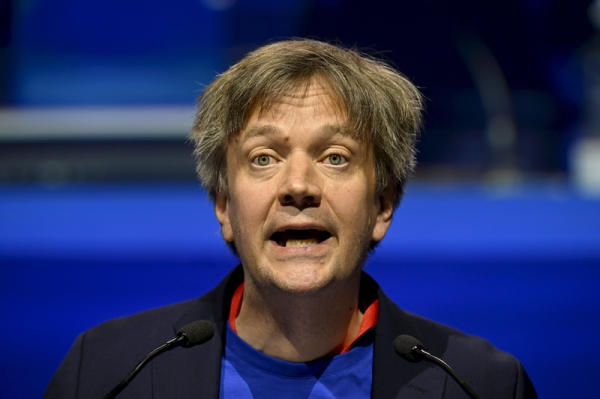Keskisarja’s immigration comments cause rift in government

A file photo of Teemu Keskisarja speaking at the Finns Party conference in Lahti. Photo: Vesa Moilanen / Lehtikuva
- Next Article Purra says mass immigration will end Finnish welfare state
The Finns Party MP and deputy party chair Teemu Keskisarja has drawn widespread criticism across Finland’s political spectrum after claiming on national television that the country is experiencing a “population replacement” and receiving “low-quality” immigrants.
Speaking on Yle’s A-studio, Keskisarja described immigration as a “partially realised catastrophe” and argued that Finland had accepted “hundreds of thousands of mostly low-quality arrivals” over a single generation. He said this demographic shift would cause “clean Finnish banquets to turn into third-world pigsties and bloodbaths.”
The phrase “population replacement” refers to a conspiracy theory, often cited by far-right extremists, which suggests an organised effort to reduce the share of ethnic Europeans through migration. The Finnish Security and Intelligence Service has linked the theory to recent far-right violence and labelled it a motivating narrative for extremist actions.
Prime Minister Petteri Orpo rejected the remarks. In an interview with Helsingin Sanomat, he said, “I don’t understand this, and I cannot accept these statements.” He added that discussions would take place within the coalition and among parliamentary groups.
“We have serious issues to solve in this country, such as economic stagnation and the consequences of the war in Ukraine, and instead we are talking about this,” Orpo said.
The incident comes as the governing coalition, consisting of the National Coalition, the Finns Party, RKP, and the Christian Democrats, faces growing internal tension over the tone and substance of its immigration policy discussions.
The National Coalition MP Pia Kauma, also present at the A-studio debate, responded during the broadcast, stating, “We must not question anyone’s human dignity. They are all equal.” She later said that Keskisarja’s views do not represent the government.
Green Party leader Sofia Virta, another panellist, condemned the remarks and questioned whether this rhetoric aligns with the government’s values. “You are the deputy chair of a government party,” Virta told Keskisarja. “This is not appropriate.”
The Finnish Security and Intelligence Service’s public assessment of the “population replacement” theory was referenced multiple times in the debate. Keskisarja dismissed such connections, asserting that the theory described by the agency differs from what he claimed to observe in Finnish society.
“Population replacement is an ugly word, but true,” Keskisarja said. “More than 600,000 foreigners in one generation. That’s already twice the number of Swedish-speaking Finns.”
When asked what he meant by “low-quality” people, Keskisarja argued it referred to a lack of education and cultural compatibility. “Africans, Middle Easterners, and people from developing countries generally have poorer education and less civilised cultures,” he said, while denying any racial or religious hatred.
Christian Democrat MP Peter Östman called the language unacceptable. “A rule of thumb is that MPs should speak respectfully,” he said. “Human dignity is not measured by quality.”
RKP chair and Minister of Education Anders Adlercreutz also criticised the remarks, saying to Ilta-Sanomat, “Such statements cannot be taken seriously, but they are still serious. The path of classifying people this way is a dark one, and a historian like Keskisarja should know that.”
Coalition tensions have intensified as the Finns Party continue to promote their stance on immigration. On the day before the debate, party leader Riikka Purra said that increasing immigration would “end the welfare state.”
Keskisarja, a historian and first-term MP, has previously attracted controversy for speaking at events linked to nationalist and far-right groups. He has also used the term “integration industry” to criticise long-term state-funded integration programmes.
He told Helsingin Sanomat after the broadcast that the Prime Minister’s remarks “sounded like AI-generated jargon” and questioned Orpo’s priorities. “What issue is more important than population replacement? This concerns life and death. I won’t trivialise that,” he said.
Statistics Finland reported that 63,000 people immigrated to Finland in 2024, the majority from Ukraine. The previous year saw a similar trend. Keskisarja distinguished Ukrainians from others, calling them “brothers and sisters,” in contrast to people arriving from conflict zones like Afghanistan, Iraq, and Syria, whom he criticised for expecting Western support.
The National Coalition parliamentary group chair Jukka Kopra said that while MPs have the right to express themselves, Keskisarja had exercised that right poorly. “He clearly addressed his base. We would never accept such language from our own MPs.”
Kopra added that real solutions to immigration issues require avoiding inflammatory rhetoric. “We can and must talk openly about immigration, but without dehumanising language.”
In the A-studio debate, Keskisarja said he respects all humans equally but views “Finnishness” as something that immigrants must earn over years of work and language acquisition without state support. He defined “true Finns” as those who live responsibly and independently for several years.
Christian Democrat chair Sari Essayah called the comments inappropriate. RKP MP Otto Andersson suggested that the remarks aimed to boost The Finns Party’s polling numbers by generating controversy. “It seems clear that the goal is to provoke headlines and disrupt coalition unity,” he said.
Left Alliance MP Minja Koskela accused the Prime Minister of enabling racism, stating in a press release that Orpo will be remembered as “the Prime Minister who accepted racism to cut public services.”
MTV News political editor Jaakko Loikkanen interpreted Keskisarja’s remarks as part of a broader strategy. “The Finns Party are in a polling crisis. Immigration stirs their base, so they’re relying on inflammatory language to regain attention.”
The Prime Minister has reiterated that equality remains a constitutional value. “Finland is a country committed to equality. Human dignity is indivisible,” Orpo said.
He confirmed that the matter would be addressed within the coalition and at the parliamentary group level.
HT
- Next Article Purra says mass immigration will end Finnish welfare state
Source: www.helsinkitimes.fi
